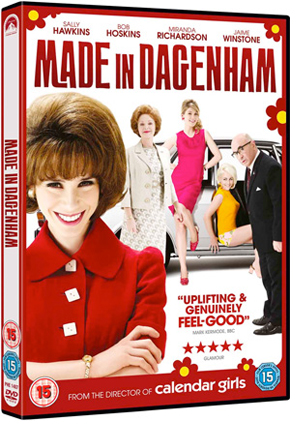 Film: Made in Dagenham (Paramount Pictures 2010)
Film: Made in Dagenham (Paramount Pictures 2010)
Screenplay: Billy Ivory
Director: Nigel Cole
Cast: Sally Hawkins, Bob Hoskins, Miranda Richardson, Geraldine James, Rosamund Pike, Andrea Riseborough, Jaime Winstone, Daniel Mays
Genre: Docudrama
?In June 1968 women sewing machinists in the Ford car plant in Dagenham took a stand for equal pay in a strike that stopped production for three weeks. They succeeded in getting abolished their lower ?women’s rate? of pay and precipitated wider action: there were other equal pay strikes that year and the National Joint Action Campaign Committee for Women’s Equal Rights (NJACCWER) was formed by women trade unionists, who organized a demonstration for equal pay in 1969. Without the Ford women, there would have been no Equal Pay Act of 1970.?
Alliance for Workers? Liberty
How Many Female Sewing Machinists Does it Take to Bring About Equal Rights for Women?
You’re not in labour activism long ere you discover a network of opposition. It starts small: you endure or witness injustice and you decide it has to stop. At first you think It’s just the boss, so you appeal to the company and to the union. Then you discover It’s the boss and the company, and maybe even the union. So you appeal to the media, the general public, the government, and even other workers in your industry, only to realize that all of these entities that had seemed to support you (or at least to be neutral) are secretly opposed to your human rights and pursuit of happiness. Why? Simply because they may stand to lose something if you get what You’re after.
You may even face opposition from your family members, who didn’t sign on to your altruism but who are nonetheless dragged along for the ride because your decision to risk your livelihood in order to create necessary change is having or could have a negative effect on their means of support.
There will of course be benefits to your actions: long-range, far-reaching benefits that will extend not only to the other workers in your local but also to workers in the industry as a whole, to workers in other industries, to labour reform in general, and to the public.
But your local may or may not benefit from your struggle, which makes labour activism, for all the adventure, a risky business, one that many in the end choose to abandon if not out of necessity then out of a sense of helplessness and despair. If you do choose to remain in the fray, it will often be simply for the pleasure of seeing social change occur, while knowing that you yourself may not personally benefit.
I watched this occur again and again in my own brief involvement with labour action. Workers in one sector of the industry would go without in order to raise standards and pay, meaning that workers in other locals and sectors in the same industry would also get raises?even if they had never touched a picket sign. Workers fired during collective action (of course not explicitly because of their union activities) lost out on benefits they’d worked hard to achieve, left with only the satisfaction of watching their former colleagues enjoying concessions for which they themselves had fought.
In 1968 the female sewing machinists at Ford’s Dagenham plant in England decided to oppose management’s decision to devalue their jobs by downgrading their skill level. Although the women lost the struggle in the end, their actions had a ripple effect upon their industry and in labour in general.
As their sense of purpose deepened, the women ended up demanding equal pay for work of equal value. Although this goal was not in fact achieved until 1984, it could not have been reached without the work and sacrifices made by the women at the Ford Dagenham plant, and the legal precedents set created in the wake of their actions.
For these women to stand up for their rights in a preposterously sexist industry and society was truly audacious, and the film Made in Dagenham brings that out in a way That’s hugely entertaining. Here we have a bunch of cheeky English birds with their easy flippancy, crude jokes, and cockney accents gutsily calling to task their own union, management, and the Ford Company. It’s a thing of beauty.
In spite of the risk and inevitable wasted efforts It’s hard to deny the sheer challenge and excitement of a workers? struggle. There’s something about knowing that You’re a mouse facing a lion and that because of all the brave little mice who came before you (and who are now ready to join you if you show yourselves sufficiently brave and good), you just might win.
The film loses points for being a bit too self-conscious and schmaltzy in spots but gains them back for great period dress, hairstyles, and music and a remarkably accurate portrayal of a momentous bit of labour history.
Made in Dagenham manifests six of the Mindful Bard’s criteria for films well worth seeing: 1) it is authentic, original, and delightful; 2) it poses and admirably responds to questions that have a direct bearing on my view of existence; 3) it harmoniously unites art with social action, saving me from both seclusion in an ivory tower and slavery to someone else’s political agenda; 4) It’s about attainment of the true self; 5) it displays an engagement with and compassionate response to suffering; and 6) it renews my enthusiasm for positive social action.

